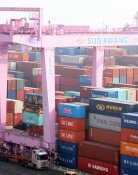North Korean Merchant Ships Invaded the South Territory
North Korean Merchant Ships Invaded the South Territory
Posted June. 03, 2001 08:16,
Three North Korean merchant ships invaded the South territory on June 2 and passed through the Cheju Island Straits and moved out to the open waters in the south and the west of the South`s territory.
According to the Joint Chiefs of Staff headquarters, three North Korean merchant ships, Cheongjin 2 (13,000 tons), Ryongunbong (6,735 tons), and Baikmagang (2,749 tons), which had passed through the open waters of the East Sea and the West Sea, invaded into the South`s territory in the South Sea and passed through the Cheju Island Straits.
It is the first incident that the North Korean merchant ships have passed through the Cheju Straits without permission. The military officials analyzed that the North intentionally committed the invasion to demand the `innocent passage` to the South and the international society.
The Joint Chiefs of Staff headquarters announced that the Korean Navy had deployed a P3C ``Orion`` aircraft, a fast patrol boat and an escort ship and guided the North Korean ships to the open waters.
30-40 crews were aboard the NK vessels, which were not armed. Cheongjin 2 and Baikmagang were known as being loaded with rice and salt respectively. The Cheju Island Straits is an area to which the `innocent passage` clause is applied, where the peaceful voyages are guaranteed by the international law. Foreign merchant ships can pass through the straits without previous permission.
However, the military has prohibited, by the operation regulation, the passage of the North Korean ships through this straits. When the North Korean ships approach the straits, the Korean navy immediately has to expel them to the open waters.
A related source of the Chief headquarters said, ``The North captain sent a notice to the Korean navy that they would pass through the Cheju Island Straits by the order of its higher level.``
The Ministry of National Defense sent, at 2:35 A.M. June 2, a protest letter to the North Korean military representative at Panmunjom, which was signed by Colonel Martin Glasser, the chief secretary of the UN Command.
Lee Chol-Hi klimt@donga.com







